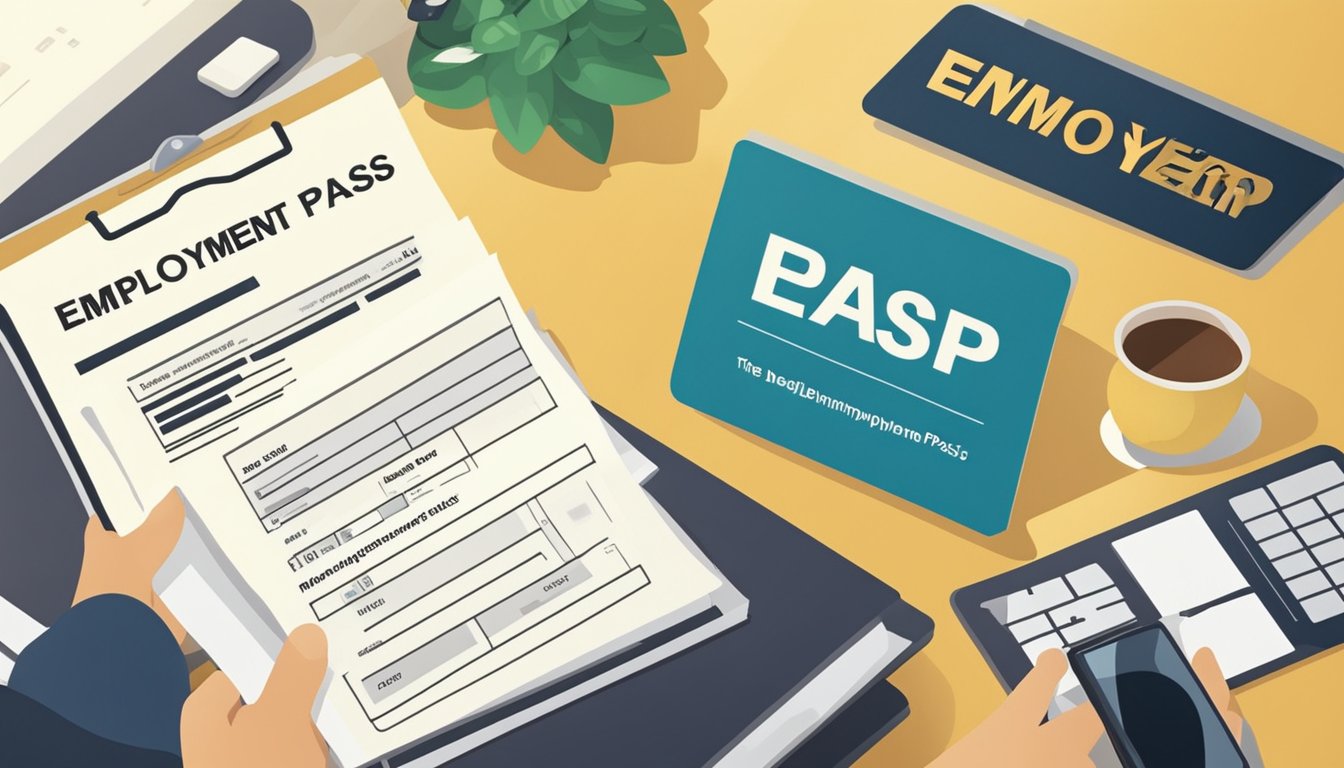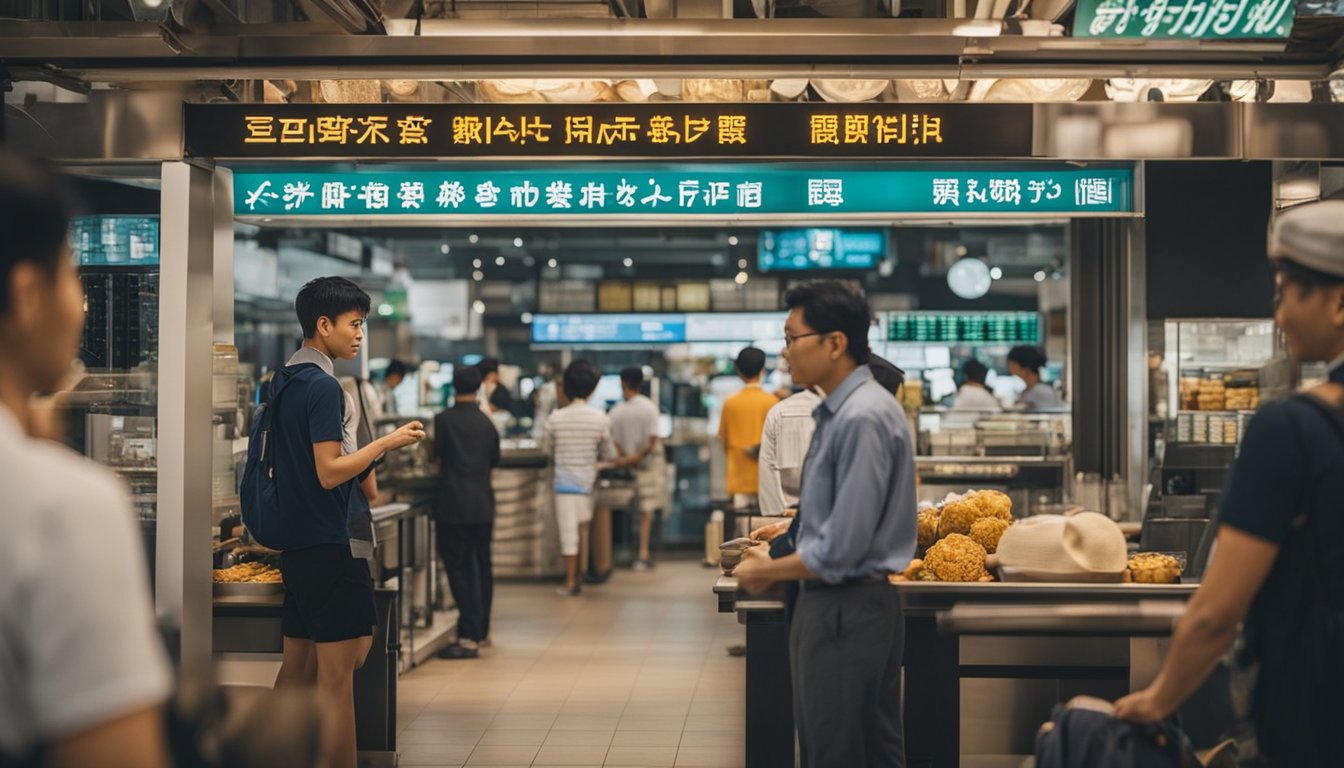If you are planning to move to Singapore, you might be wondering about the minimum salary required to live comfortably in this city-state. The cost of living in Singapore is high, with housing, transport, and food being the biggest expenses. According to a study by the Lee Kuan Yew School of Public Policy, a “reasonable starting point” for a living wage in Singapore is S$2,906 per month source. However, this amount might not be enough for expats who are used to a certain standard of living.

Understanding Singapore’s economy and job market is crucial to knowing what salary you need to stay in Singapore. The city-state has a highly developed and diversified economy, with a focus on manufacturing, finance, and services. The job market is competitive, and employers are always looking for skilled and qualified professionals. To attract foreign talent, the Singapore government has introduced various schemes such as the Employment Pass (EP) framework and the S Pass scheme, which allow foreigners to work in Singapore if they meet certain criteria.
Key Takeaways
- A “reasonable starting point” for a living wage in Singapore is S$2,906 per month.
- Understanding Singapore’s economy and job market is crucial to knowing what salary you need to stay in Singapore.
- The Employment Pass (EP) framework and the S Pass scheme are two of the schemes introduced by the Singapore government to attract foreign talent.
Understanding Singapore’s Economy and Job Market

If you are planning to work and stay in Singapore, it is essential to have a good understanding of the economy and job market. Singapore has a highly developed and diversified economy and is considered one of the most business-friendly countries in the world. The city-state has a strong financial services sector, which contributes significantly to the country’s economy.
Economic Overview
Singapore’s economy is heavily reliant on exports, with the country being one of the world’s busiest ports. The manufacturing sector is a significant contributor to the economy, with electronics, chemicals, and biomedical sciences being the key industries. The country is also a hub for oil refining and has a thriving service sector, which includes tourism, logistics, and professional services.
The Role of Foreign Talent
Singapore has a highly skilled workforce, but the country also relies on foreign talent to fill skill shortages in certain sectors. The government has implemented various policies to attract and retain foreign talent, such as the Employment Pass scheme, which allows skilled foreign workers to work in Singapore. However, there has been some debate about the role of foreign talent in Singapore’s job market and the impact it has on local workers.
Sectors in Focus
Some sectors in Singapore are currently in focus due to the global competition and skill shortages. The government has identified these sectors as key growth areas and has implemented various measures to support them. These sectors include:
- Information Technology: The demand for IT professionals is high, and the government has implemented initiatives to encourage more students to pursue IT-related courses.
- Healthcare: Singapore has an ageing population, which has led to an increased demand for healthcare professionals. The government has implemented various measures to attract and retain healthcare professionals.
- Financial Services: The financial services sector is a significant contributor to Singapore’s economy. The government has implemented various measures to attract and retain talent in this sector, such as the Financial Sector Incentive Scheme.
Overall, Singapore’s economy and job market are exciting and offer many opportunities for skilled professionals. However, it is essential to have a good understanding of the economy and job market to make informed decisions about your career in Singapore.
The Employment Pass (EP) Framework

If you are a foreigner planning to work in Singapore, you will need to obtain an Employment Pass (EP). The EP is a work visa that allows you to work and live in Singapore. This section will provide you with an overview of the EP framework, including eligibility and requirements, minimum qualifying salary, and renewal applications and criteria.
EP Eligibility and Requirements
To be eligible for an EP, you must meet certain requirements. First, you must have a job offer from a Singaporean employer. Second, you must have the necessary qualifications and work experience for the job. Third, your employer must submit the EP application on your behalf. Finally, you must pass the Ministry of Manpower’s (MOM) assessment of your application.
Minimum Qualifying Salary for EP Holders
The minimum qualifying salary for EP holders varies depending on your qualifications and work experience. Generally, the more qualified and experienced you are, the higher your minimum qualifying salary will be. As of September 2022, the minimum qualifying salary for new EP applicants is S$5,000 per month. However, if you work in certain sectors, such as financial services, you may be subject to a higher minimum qualifying salary.
Renewal Applications and Criteria
EP holders can renew their EPs as long as they continue to meet the eligibility criteria. To renew your EP, you must submit an application to MOM at least six months before your current EP expires. MOM will assess your application based on your salary, qualifications, and work experience. If you meet the renewal criteria, you will be granted a new EP.
In conclusion, the EP framework is a crucial part of working in Singapore as a foreigner. By understanding the EP eligibility and requirements, minimum qualifying salary, and renewal applications and criteria, you can ensure that you meet the necessary criteria to work and live in Singapore.
The S Pass Scheme

If you are a foreign professional or technician seeking employment in Singapore, you may be eligible for an S Pass. This work visa is designed for mid-level skilled workers who earn a salary above a certain threshold.
Understanding the S Pass
The S Pass is a work visa that allows mid-level skilled workers to work in Singapore. It is granted to foreign professionals and technicians who earn a salary of at least $2,500 per month. The S Pass is subject to a quota system, which limits the number of foreign workers that a company can hire. This quota is known as the Dependency Ratio Ceiling (DRC) and is set based on the industry and the size of the company.
Minimum Salary for S Pass Holders
To be eligible for an S Pass, foreign professionals and technicians must earn a minimum salary of $2,500 per month. However, this minimum salary is subject to change. In Budget 2022, the minimum qualifying salary for new S Pass applicants will go up to S$3,000 from the current S$2,500. In addition, older candidates may require a higher salary to qualify.
Renewals and Dependency Ratio Ceiling
S Pass holders can renew their work visa as long as they continue to meet the eligibility criteria. However, the renewal is subject to the Dependency Ratio Ceiling (DRC). The DRC is the maximum percentage of foreign workers that a company can hire. The DRC is calculated based on the industry and the size of the company.
In addition, the S Pass is also subject to a foreign worker levy, which is a fee that employers must pay for each foreign worker they hire. The levy amount depends on the industry and the number of foreign workers that the company employs.
Overall, the S Pass is a work visa that offers foreign professionals and technicians the opportunity to work in Singapore. To be eligible for the S Pass, you must earn a minimum salary of $2,500 per month, subject to change. The renewal of the S Pass is subject to the Dependency Ratio Ceiling and the foreign worker levy.
Salary Benchmarks Across Key Sectors

If you are planning to work and stay in Singapore, it is important to know the minimum salary benchmarks across key sectors to ensure that you can afford the cost of living. According to the Ministry of Manpower, the salary benchmarks for the C1 Employment Pass holders, which includes professionals, managers, and executives, varies depending on age and sector.
Technology and Finance
If you are working in the technology or finance sector, the required salary for 10 points (65th percentile of local PMETs) is SGD 5,155, while the required salary for 20 points (90th percentile of local PMETs) is SGD 7,704. This benchmark applies to those who are 23 years old or below.
Construction and Process Sectors
For those working in the construction and process sectors, the required salary for 10 points is SGD 4,182, while the required salary for 20 points is SGD 5,388. This benchmark applies to those who are 23 years old or below. The construction and process sectors are known to have lower salary benchmarks compared to other sectors due to lower productivity.
Healthcare and Education
If you are working in the healthcare or education sector, the required salary for 10 points is SGD 5,745, while the required salary for 20 points is SGD 8,858. This benchmark applies to those who are 25 years old or below. The higher salary benchmarks in these sectors reflect the higher productivity and skills required.
It is worth noting that the Finance Minister Lawrence Wong, in his budget speech in 2021, emphasized the importance of raising productivity and wages in Singapore. This is in line with the government’s efforts to transform the economy and ensure sustainable growth.
Complementarity and Diversity in the Workforce

Singapore has always been a melting pot of cultures, and this is reflected in its workforce. The government has recognised the importance of complementarity and diversity in the workforce and has taken steps to promote it.
Balancing Local and Foreign Workforce
The government has implemented policies to balance the local and foreign workforce. One such policy is the Complementarity Assessment Framework (COMPASS), which assesses the complementarity of the skills of foreign professionals to those of the local workforce. From 1 September 2023, new Employment Pass (EP) candidates need to pass the points-based COMPASS in addition to meeting the EP qualifying salary. The EP minimum qualifying salary was raised to $5,000 for the general economy and $5,500 for the Financial Services sector from 1 September 2022. The qualifying salary for older candidates was increased in tandem.
Promoting Diversity and Inclusion
The government has also been promoting diversity and inclusion in the workforce. The Tripartite Alliance for Fair and Progressive Employment Practices (TAFEP) was established to promote fair employment practices and eliminate discrimination. Employers are encouraged to adopt fair employment practices, such as recruiting and promoting based on merit, regardless of age, race, gender, religion or disability.
In addition, the government has introduced various schemes to encourage employers to hire and retain mature workers, persons with disabilities and women. For example, the WorkPro scheme provides funding to employers who implement age management practices, workplace flexibility arrangements and job redesign for older workers. The Enabling Employment Credit (EEC) provides employers with wage offsets when they hire and retain persons with disabilities. The Enhanced Work-Life Grant (EWLG) provides funding to employers who implement flexible work arrangements for their employees.
In conclusion, complementarity and diversity in the workforce are crucial for Singapore’s economic growth and social cohesion. The government’s policies and schemes have been effective in promoting a balanced and inclusive workforce. As an employee or employer in Singapore, it is important to embrace these values and contribute to a diverse and inclusive workplace.
Regulatory and Compliance Aspects

If you are a foreign professional working in Singapore, you need to be aware of the regulatory and compliance aspects that govern your employment. The Ministry of Manpower (MOM) has set out various policies and quotas that employers must adhere to when hiring foreign workers. Moreover, employers have legal obligations that they need to fulfil to ensure that they are compliant with the law.
Government Policies and Quotas
To stay in Singapore, you need to ensure that your employer has obtained the necessary work permits and visas for you. MOM has set out various policies and quotas that employers must adhere to when hiring foreign workers. For instance, employers must comply with the Fair Consideration Framework (FCF), which requires them to consider Singaporeans fairly for job vacancies before hiring foreign professionals. Employers must also comply with the Dependency Ratio Ceiling (DRC), which sets limits on the number of foreign workers that a company can hire based on its industry and workforce size.
Legal Obligations for Employers
Employers in Singapore have legal obligations that they need to fulfil to ensure that they are compliant with the law. For instance, employers must pay their employees the minimum salary that is set by MOM. The minimum salary varies depending on the industry and the employee’s qualifications and experience. MOM also requires employers to provide their employees with medical insurance, work injury compensation insurance, and personal accident insurance.
Employers must also ensure that they are providing manpower-efficient solutions. This means that they must ensure that their workforce is productive and efficient. To achieve this, employers can implement various measures such as training and development programmes, performance management systems, and employee engagement initiatives.
In summary, to stay in Singapore, you need to ensure that your employer is compliant with the regulatory and compliance aspects that govern your employment. This means that your employer must comply with the relevant government policies and quotas and fulfil their legal obligations. By doing so, you can ensure that you have a smooth and hassle-free experience working in Singapore.
Supporting Expatriates in Singapore

If you are an expatriate in Singapore, you will be pleased to know that the government has put in place several measures to support you during your stay. Here are some of the things you should know about.
Accommodation and Cost of Living
Accommodation and the cost of living in Singapore can be quite expensive. However, the good news is that there are several options available to you. You can choose to rent an apartment or a house, or you can opt for a serviced apartment. Serviced apartments are fully furnished and come with all the amenities you need, including housekeeping, laundry, and even meals. They are a great option if you are only planning to stay in Singapore for a short period.
Healthcare and Insurance Requirements
Healthcare in Singapore is of a high standard, and the government has put in place several measures to ensure that expatriates have access to quality medical care. As an expatriate, you are required to have medical insurance. You can either purchase insurance from a local provider or opt for an international health insurance plan. It is also worth noting that Singapore has a mandatory health screening program for certain categories of work pass holders, including Employment Pass (EP) holders.
Education and Family Considerations
If you are moving to Singapore with your family, you will be pleased to know that there are several international schools in the country. These schools offer a high standard of education and follow the International Baccalaureate (IB) curriculum. However, the fees can be quite high, so it is worth considering this when planning your budget.
If you are an EP holder, your spouse and children are eligible to apply for a Dependant’s Pass. This pass allows them to live and work in Singapore for the duration of your employment. Permanent residents also have access to a range of benefits, including healthcare and education.
In conclusion, Singapore is a great place to live and work as an expatriate. The government has put in place several measures to support expatriates during their stay, including measures to support accommodation, healthcare, and education.
Frequently Asked Questions

How much do you need to earn monthly to live comfortably in Singapore?
To live comfortably in Singapore, you need to earn at least SGD 6,000 per month. This is according to a survey by HSBC in 2022. With this salary, you can afford to rent a decent apartment, enjoy some leisure activities, and save some money.
What’s the basic income required for expatriates in Singapore?
The basic income required for expatriates in Singapore is SGD 10,000 per month. This amount covers the cost of living, including housing, food, transportation, and entertainment. However, this amount may vary depending on the lifestyle of the expatriate.
What constitutes a decent living wage in Singapore for a family of four?
A decent living wage for a family of four in Singapore is around SGD 9,000 per month. This amount covers the basic needs of the family, including housing, food, transportation, and education. However, this amount may vary depending on the lifestyle of the family.
Is 3500 SGD per month considered sufficient for a good standard of living in Singapore?
A salary of SGD 3,500 per month may not be sufficient for a good standard of living in Singapore. This amount may cover the basic needs, but it may not be enough to afford a comfortable lifestyle. Additionally, the cost of living in Singapore is relatively high, and expenses such as housing and healthcare can be expensive.
What salary range is deemed low and might challenge survival in Singapore?
A salary range of SGD 1,500 to SGD 2,500 per month is considered low and might challenge survival in Singapore. This amount may not be enough to cover the basic needs, including housing, food, and healthcare. It is important to note that the cost of living in Singapore is relatively high, and expenses such as transportation and education can add up quickly.
What are the minimum income standards to maintain a decent lifestyle in Singapore?
The minimum income standards to maintain a decent lifestyle in Singapore vary depending on the individual’s needs and lifestyle. However, according to a survey by the Ministry of Manpower, the basic income required for a single person to maintain a decent lifestyle is SGD 2,000 per month. This amount covers the basic needs, including housing, food, and transportation.

